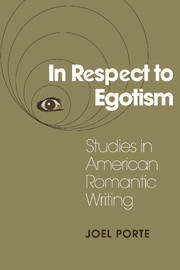Book contents
- Frontmatter
- Contents
- Preface
- Acknowledgments
- In Respect to Egotism
- Introduction: Writing, Reading, Romanticism
- 1 “Where … Is This Singular Career to Terminate?”: Bewildered Pilgrims in Early American Fiction
- 2 “Where There Is No Vision, the People Perish.…”: Prophets and Pariahs in the Forest of the New World
- 3 Poe: Romantic Center, Critical Margin
- 4 Emerson: Experiments in Self-Creation
- 5 Hawthorne: “The Obscurest Man of Letters in America”
- 6 Thoreau's Self-Perpetuating Artifacts
- 7 Melville: Romantic Cock-and-Bull; or, The Great Art of Telling the Truth
- 8 Douglass and Stowe: Scriptures of the Redeemed Self
- 9 Whitman: “Take Me as I Am or Not at All.…”
- Interchapter: Walt and Emily
- 10 Dickinson's “Celestial Vail”: Snowbound in Self-Consciousness
- Notes
- Index
- CAMBRIDGE STUDIES IN AMERICAN LITERATURE AND CULTURE
1 - “Where … Is This Singular Career to Terminate?”: Bewildered Pilgrims in Early American Fiction
Published online by Cambridge University Press: 24 March 2010
- Frontmatter
- Contents
- Preface
- Acknowledgments
- In Respect to Egotism
- Introduction: Writing, Reading, Romanticism
- 1 “Where … Is This Singular Career to Terminate?”: Bewildered Pilgrims in Early American Fiction
- 2 “Where There Is No Vision, the People Perish.…”: Prophets and Pariahs in the Forest of the New World
- 3 Poe: Romantic Center, Critical Margin
- 4 Emerson: Experiments in Self-Creation
- 5 Hawthorne: “The Obscurest Man of Letters in America”
- 6 Thoreau's Self-Perpetuating Artifacts
- 7 Melville: Romantic Cock-and-Bull; or, The Great Art of Telling the Truth
- 8 Douglass and Stowe: Scriptures of the Redeemed Self
- 9 Whitman: “Take Me as I Am or Not at All.…”
- Interchapter: Walt and Emily
- 10 Dickinson's “Celestial Vail”: Snowbound in Self-Consciousness
- Notes
- Index
- CAMBRIDGE STUDIES IN AMERICAN LITERATURE AND CULTURE
Summary
Charles Brockden Brown's appearance as a serious novelist in 1798 may be understood both in terms of the felt need for a truly national literary expression in the decade after the Revolution and in the light of the nascent Romantic movement generally, with its emphasis on individualism, sensibility, psychological analysis, and a more direct relationship to the natural world. Brown clearly saw himself as writing distinctively American fiction, yet the impulse to begin his career seems to have come from European sources, notably from his reading of Godwin's Caleb Williams, which may be characterized, however qualifiedly, as a Gothic novel. Brown's first significant publication, Wieland, now generally viewed as an American-Calvinist melodrama, represents the amalgamation of both nativist and imported elements in the service of a developing tradition that Hawthorne would later define as “psychological romance.” It was precisely this tradition that Margaret Fuller pointed to in 1846 when she linked Godwin and Brown as “the dark masters, because they disclose the twilight recesses of the human heart.”
By 1798 there was, of course, a well-established body of English fiction with which Americans were familiar. One need name only Richardson, Fielding, Goldsmith, Smollett, Edgeworth, Burney. English Gothic fiction was an eccentric, though popular, spur off that main line. Why did Brown begin under its aegis, rather than as an imitator of Fielding? What were the English and American narrative modes and antecedents that influenced the primary direction his work would take? Such questions remind us that the appearance of Brown's novels exemplified the odd and perhaps fortuitous conjunction of some indigenous traditions and a minor but important strain in English writing.
- Type
- Chapter
- Information
- In Respect to EgotismStudies in American Romantic Writing, pp. 31 - 53Publisher: Cambridge University PressPrint publication year: 1991

